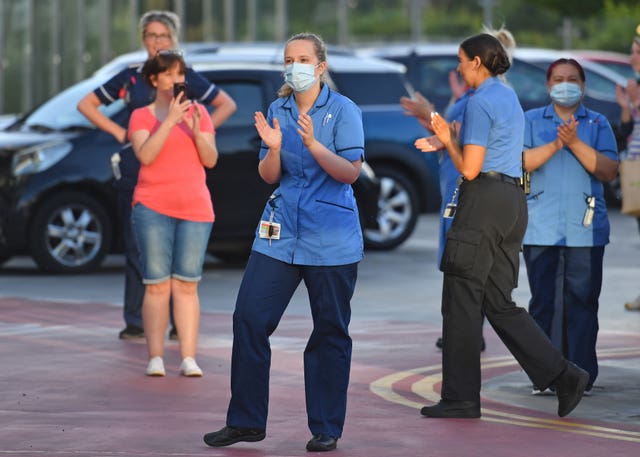Public feel ‘proud to be British’ thanks to NHS staff
A survey of health professionals for NHS Charities Together found 88% of NHS staff feel proud to work for the NHS.

Two-thirds of people say the hard work of NHS staff during the Covid pandemic makes them proud to be British.
A new poll for NHS Charities Together, for which Captain Sir Tom Moore raised almost £33 million, found that 86% of the general public agree NHS staff have been “there for us” during the pandemic.
The YouGov survey of more than 2,000 people also found 63% say they respect NHS healthcare workers while 28% would consider a role in the NHS if they were starting their career again.
Meanwhile, a separate YouGov survey of 1,009 health professionals for the charity found 88% of NHS staff feel proud to work for the NHS.
However, just over half said their mental health has declined since the start of the pandemic, with over two thirds of these (67%) reporting anxiety and a third (35%) reporting depression.
Staff attributed the greatest impact on their mental health to not being able to see friends and family (61%), not being able to make plans for the future (31%), concern about passing on Covid-19 to someone close to them (31%) and worrying about their increased risks of catching and being seriously affected by Covid-19 (24%).
NHS Charities Together is launching a new appeal urging the public to be “there for them” as NHS staff face the “triple challenge” of dealing with the continuing impact of Covid, tackling the backlog of patients who need treatment and protecting their own mental health.
The charity, which is made up of 241 NHS charity members, wants to raise money to increase mental health and wellbeing programmes for NHS staff across the UK.

Its chief executive Ellie Orton said: “The NHS is doing a magnificent job combating the pandemic and supporting the patients and families affected, but some of the burden is falling on NHS staff and it is taking its toll.
“Staff have been making difficult decisions every day when caring for very ill patients.
“The public showed overwhelming support for NHS staff over the last year, and we need to continue to be there for them, now and in the longer term as the NHS recovers from the most challenging time in its history.
“The NHS is doing all it can to support staff in this area, but the scale of the challenge is so huge.
“They need all of our support.
“It makes a huge difference for them knowing the public has got their back.”
Dr Agnes Arnold-Forster, a historian of medicine and healthcare at the University of Bristol, said: “While doctors and nurses are almost universally lauded professions, Britain is unusual in the amount of emotional importance it attaches to the NHS and it is one of the few countries in the world which ties its national identity so closely to its healthcare system.
“The NHS was not always so highly prized, but the pandemic has only strengthened the commitment of the British public to its healthcare professionals.
“However, the outsourcing of mental and emotional support to charities and other external bodies is worrying.
“Hospitals and other healthcare organisations must take responsibility for their employees’ wellbeing as many of the problems they encounter are not new or specific to this past year, but are instead longstanding issues around working conditions, pay and professional autonomy.”





